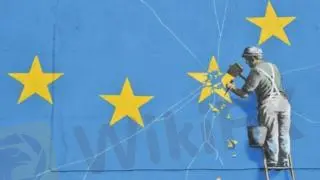简体中文
繁體中文
English
Pусский
日本語
ภาษาไทย
Tiếng Việt
Bahasa Indonesia
Español
हिन्दी
Filippiiniläinen
Français
Deutsch
Português
Türkçe
한국어
العربية
Blocking Brexit could cause far-right surge - Grayling
Abstract:Image copyrightAFP Blocking Brexit could lead to a surge in far-right extremism in the UK, a cabinet

Blocking Brexit could lead to a surge in far-right extremism in the UK, a cabinet minister has said.
Transport Secretary Chris Grayling told the Daily Mail that not leaving the EU would cause the 17 million people who voted for Brexit to feel "cheated".
This could end centuries of "moderate" politics in the UK, he said, as he urged his colleagues to back Prime Minister Theresa May's Brexit deal.
A vote on the agreement takes place in the Commons on Tuesday.
MPs are widely expected to reject the deal, negotiated between the EU and UK, with more than 100 Conservative MPs among those opposing it.
Some ministers have warned the UK faces Brexit "paralysis" if this happens.
'Nastiness in politics'Just days before the critical vote, Mr Grayling, who campaigned to leave the EU, told the Daily Mail there would be a "different tone" in British politics if the UK failed to leave the EU, and predicted a "less tolerant society" and a "more nationalistic nation".
"It will open the door to extremist populist political forces in this country of the kind we see in other countries in Europe," Mr Grayling told the paper.
"If MPs who represent seats that voted 70% to leave say 'sorry guys, we're still going to have freedom of movement', they will turn against the political mainstream," he added.
"There's already a nastiness and unpleasantness in our politics, more people with extreme views, more people willing to behave in an uncivilised way," he said.
Lord Hattersley, a former deputy Labour Party leader, dismissed Mr Grayling's comments, saying not many would regard him as "an expert in these matters".
He told BBC Radio 4's Today programme that he did not believe a general election - which Labour leader Jeremy Corbyn has pushed for - would happen.
Lord Hattersley, a minister in the Wilson and Callaghan governments, called for another referendum, saying the party had to risk losing the support of Labour supporters who voted to leave the EU in order to do the "right" thing.
Quick guide: What is a no-deal Brexit?
A "no-deal" Brexit is where the UK would cut all ties with the European Union overnight.
Theresa May's government, and many others, believe this would be hugely damaging and want a more gradual withdrawal. But if Parliament can't agree on that, and nothing else takes its place, the UK will leave without a deal.
This would mean the UK would not have to obey EU rules. Instead, it would need to follow World Trade Organization terms on trade. Many businesses would see new taxes on imports, exports and services, which are likely to increase their operating costs. That means the prices of some goods in UK shops could go up.
The UK would also lose the trade agreements it had with other countries as a member of the EU, all of which would need to be renegotiated alongside the new agreement with the EU itself.
Manufacturers in the UK expect to face delays in components coming across the border.
The UK would be free to set its own immigration controls. However some UK professionals working in the EU and UK expats could face uncertainty until their status was clarified. The European Commission has said that even in a no-deal scenario, UK travellers won't need a visa for short visits of up to 90 days.
The border between Northern Ireland and the Irish republic would become an external frontier for the EU with customs and immigration controls, though how and where any checks would be made is not clear.
Some Leave supporters think that leaving without a deal would be positive if the right preparations were made. They say criticism is scaremongering and any short term pain would be for long term gain.
But critics - including both Brexit supporters and opponents - say that leaving without a deal would be a disaster for the UK: driving up food prices, leading to shortages of goods and gridlock on some roads in the South East resulting from extra border checks.
Image copyrightPAImage caption There have been pro-Brexit protests at Westminster- Can Parliament stop a no-deal Brexit?
- UK faces Brexit 'paralysis' - Hunt
- Kuenssberg: What could change dynamics of Brexit vote?
Mr Grayling's intervention comes after his Conservative colleagues warned about the possibility of the UK leaving the EU with no deal.
Northern Ireland Secretary Karen Bradley said a no-deal exit would create a "feeling of unrest".
Tory rebel Dominic Grieve, who tabled the amendment that led to a second government defeat on Brexit last week, urged the prime minister to delay Brexit if her EU deal was rejected by MPs.
Mr Grieve is among a group of MPs calling for another referendum.
Disclaimer:
The views in this article only represent the author's personal views, and do not constitute investment advice on this platform. This platform does not guarantee the accuracy, completeness and timeliness of the information in the article, and will not be liable for any loss caused by the use of or reliance on the information in the article.
WikiFX Broker
Latest News
BSP Shuts Down Uno Forex Over Serious AML Violations
ACY Securities Expands Global Footprint with South Africa Acquisition
Why Even the Highly Educated Fall Victim to Investment Scams?
Warning Against Globalmarketsbull & Cryptclubmarket
Rupee gains against Euro
Tokyo Police Arrest 4 for Unregistered FX Trading Scheme
Axi Bids AUD 52M to Acquire Low-Cost Broker SelfWealth, Outbidding Competitor Bell Financial
Crypto Influencer's Body Found Months After Kidnapping
US Regulators Tighten Oversight on Bank Anti-Money Laundering Efforts
Doo Group Expands Its Operations with CySEC License
Currency Calculator


